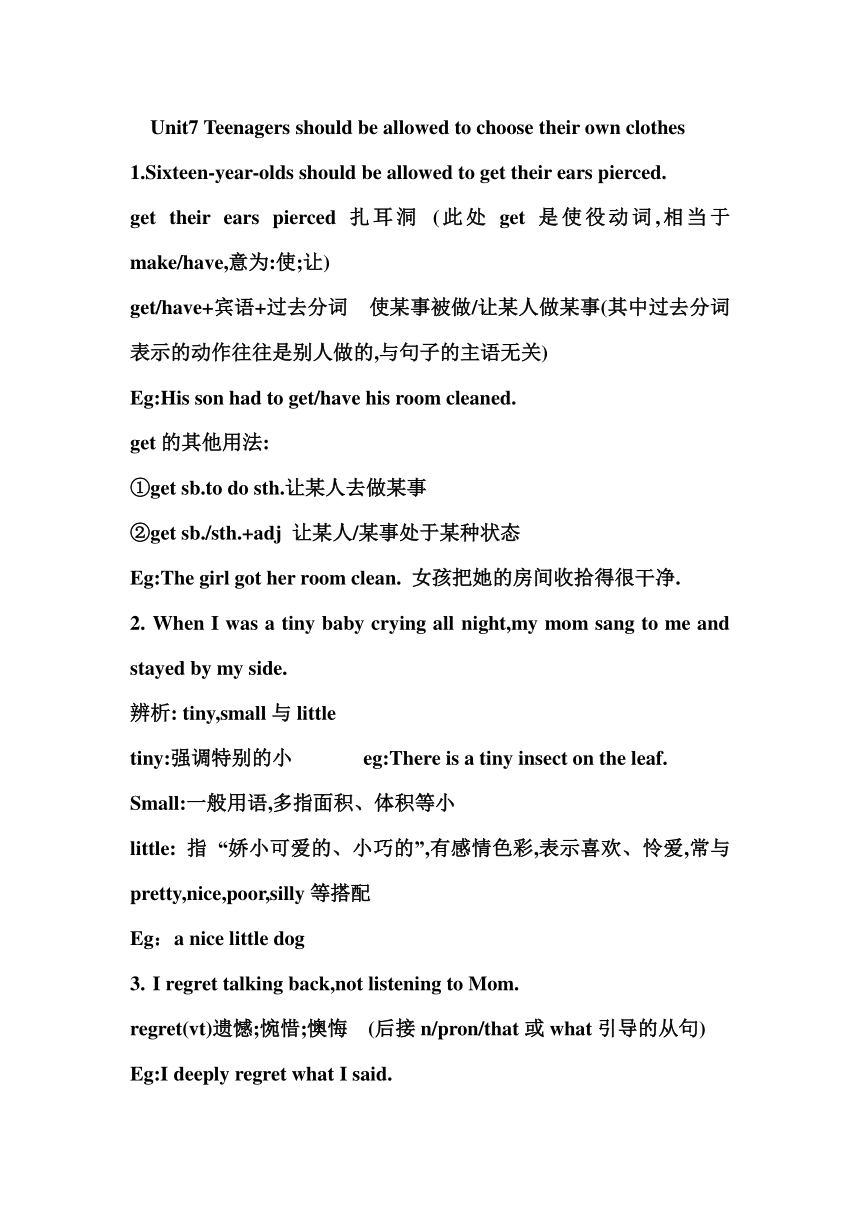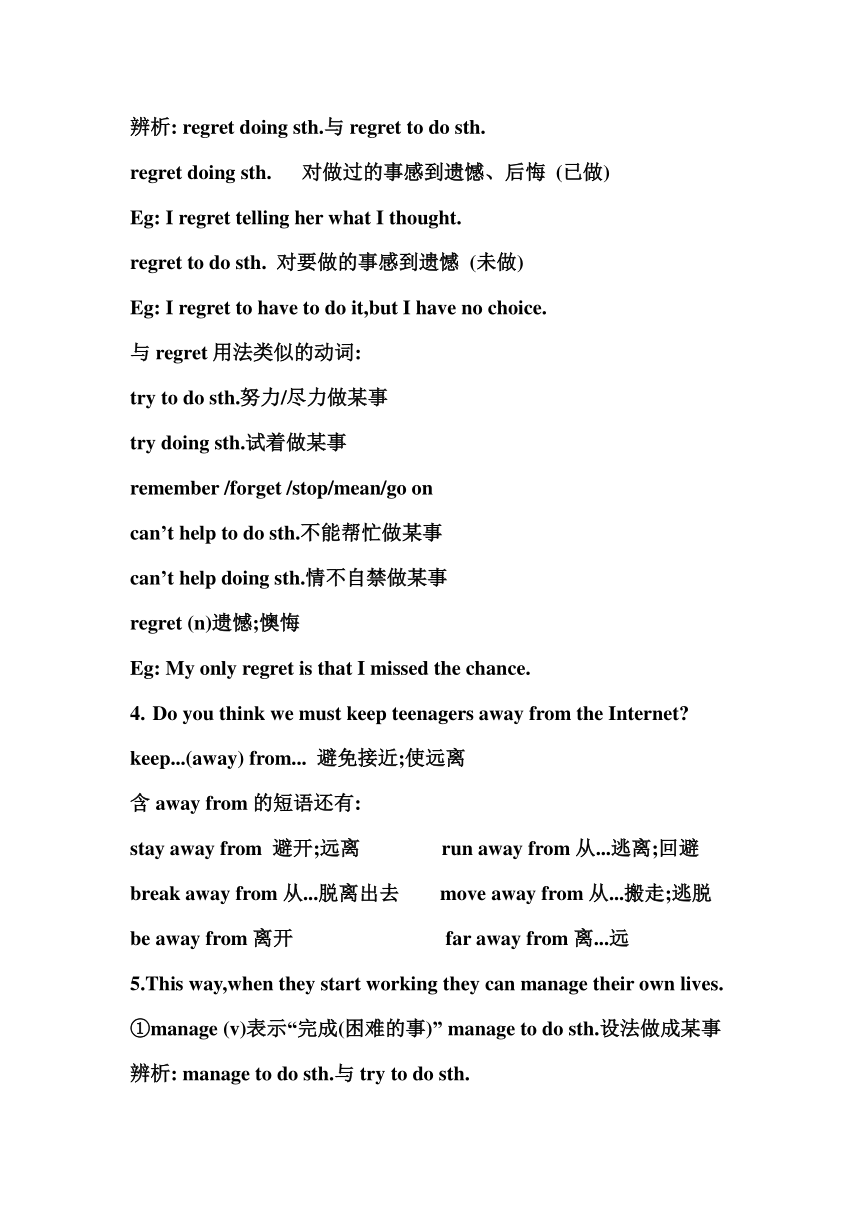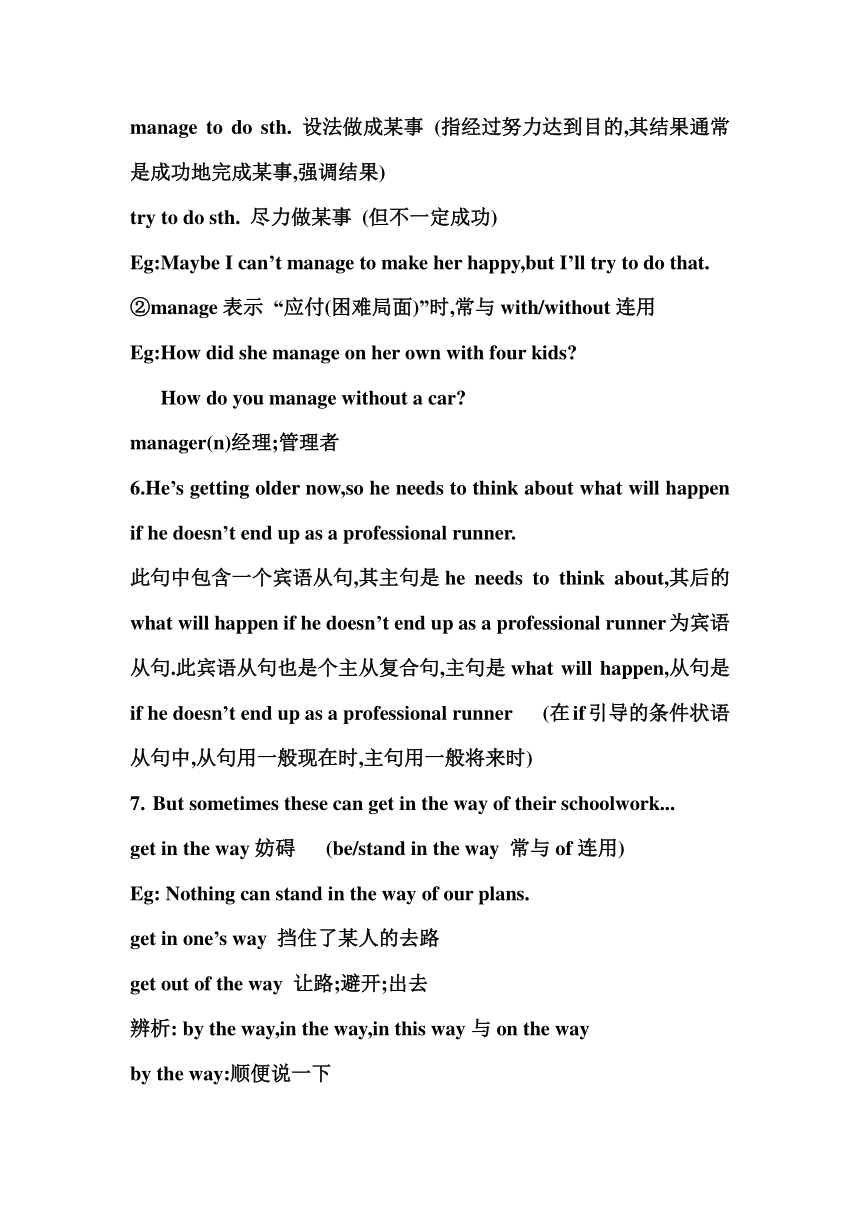Unit 7 Teenagers should be allowed to choose their own clothes知识点讲义
文档属性
| 名称 | Unit 7 Teenagers should be allowed to choose their own clothes知识点讲义 |  | |
| 格式 | docx | ||
| 文件大小 | 21.8KB | ||
| 资源类型 | 教案 | ||
| 版本资源 | 人教新目标(Go for it)版 | ||
| 科目 | 英语 | ||
| 更新时间 | 2024-01-11 21:11:03 | ||
图片预览



文档简介
Unit7 Teenagers should be allowed to choose their own clothes
1.Sixteen-year-olds should be allowed to get their ears pierced.
get their ears pierced 扎耳洞 (此处get是使役动词,相当于make/have,意为:使;让)
get/have+宾语+过去分词 使某事被做/让某人做某事(其中过去分词表示的动作往往是别人做的,与句子的主语无关)
Eg:His son had to get/have his room cleaned.
get的其他用法:
①get sb.to do sth.让某人去做某事
②get sb./sth.+adj 让某人/某事处于某种状态
Eg:The girl got her room clean. 女孩把她的房间收拾得很干净.
When I was a tiny baby crying all night,my mom sang to me and stayed by my side.
辨析: tiny,small与little
tiny:强调特别的小 eg:There is a tiny insect on the leaf.
Small:一般用语,多指面积、体积等小
little: 指 “娇小可爱的、小巧的”,有感彩,表示喜欢、怜爱,常与pretty,nice,poor,silly等搭配
Eg:a nice little dog
I regret talking back,not listening to Mom.
regret(vt)遗憾;惋惜;懊悔 (后接n/pron/that或what引导的从句)
Eg:I deeply regret what I said.
辨析: regret doing sth.与regret to do sth.
regret doing sth. 对做过的事感到遗憾、后悔 (已做)
Eg: I regret telling her what I thought.
regret to do sth. 对要做的事感到遗憾 (未做)
Eg: I regret to have to do it,but I have no choice.
与regret用法类似的动词:
try to do sth.努力/尽力做某事
try doing sth.试着做某事
remember /forget /stop/mean/go on
can’t help to do sth.不能帮忙做某事
can’t help doing sth.情不自禁做某事
regret (n)遗憾;懊悔
Eg: My only regret is that I missed the chance.
Do you think we must keep teenagers away from the Internet
keep...(away) from... 避免接近;使远离
含away from的短语还有:
stay away from 避开;远离 run away from从...逃离;回避
break away from从...脱离出去 move away from从...搬走;逃脱
be away from离开 far away from离...远
5.This way,when they start working they can manage their own lives.
①manage (v)表示“完成(困难的事)” manage to do sth.设法做成某事
辨析: manage to do sth.与try to do sth.
manage to do sth. 设法做成某事 (指经过努力达到目的,其结果通常是成功地完成某事,强调结果)
try to do sth. 尽力做某事 (但不一定成功)
Eg:Maybe I can’t manage to make her happy,but I’ll try to do that.
②manage表示 “应付(困难局面)”时,常与with/without连用
Eg:How did she manage on her own with four kids
How do you manage without a car
manager(n)经理;管理者
6.He’s getting older now,so he needs to think about what will happen if he doesn’t end up as a professional runner.
此句中包含一个宾语从句,其主句是he needs to think about,其后的what will happen if he doesn’t end up as a professional runner为宾语从句.此宾语从句也是个主从复合句,主句是what will happen,从句是 if he doesn’t end up as a professional runner (在if引导的条件状语从句中,从句用一般现在时,主句用一般将来时)
But sometimes these can get in the way of their schoolwork...
get in the way妨碍 (be/stand in the way 常与of连用)
Eg: Nothing can stand in the way of our plans.
get in one’s way 挡住了某人的去路
get out of the way 让路;避开;出去
辨析: by the way,in the way,in this way与on the way
by the way:顺便说一下
in the way:挡路;妨碍
in this way用这种方法;以这种方式
Eg: Only in this way can we work out the problem.
on the way在途中
My wife and I have supported every one of his races.
support(v)支持 ~sb.in sth.在某事上支持某人
support(cn)支柱;支撑物 (un)支持;拥护
Eg:The supports under the bridge were starting to bend.
桥下面的支柱开始弯曲
Thanks for your support.
support sb.=give support to sb.支持某人
support a family养家 in support of 支持
enter university
①(vi/vt)进来;进去 (通常不用于被动语态)
Eg: Knock before you enter.
②(vt)考上(学校/大学);开始从事(某职业);加入(某组织)
Eg:Both the boys entered the university.
③(vt)在计算机领域中可表示 “输入(信息)”, (vt/vi) “进入(计算机系统)”
Eg: Press the return key to enter the information.(按回车键输入信息)
10.I think I should be allowed to make this choice myself.
choice (n)选择;挑选 (其动词形式为choose)
make a choice/make choices 做出选择
have no choice (but to do sth.)别无选择(只能做某事)
choose=make a choice
promise=make a promise
apologize=make an apology
invite=make an invitation
mistake=make a mistake
wish=make a wish
use=make(the)use of
decide=make a decision
11.Only then will I have a chance to achieve my dream.
本句是以only开头的部分倒装结构,only意为 “只有(直到)...;才...”
以only开头的部分倒装结构为 “Only+adv/介词短语/状语从句+助动词/be动词/情态动词+主语+其他”
Eg: Only recently have I had time to read this book. (I have倒装为have I)
Only by working hard can we succeed.(we can倒装为can we)
注意: ①当only位于句首修饰主语时,不用倒装
Eg: Only Lily felt nervous.
②only所修饰的状语如果不在句首,则不到倒装
Eg: We will succeed only when we try our best.
含有情态动词的被动语态
1.should作情态动词,意为:应当; 含有should的被动语态结构为: should+be+及物动词的过分
在本单元中出现得最多的是: should be allowed to do
2.除了should之外,can,could,may,might,will,would等也有被动语态 结构为:情态动词+be+过分
3.含有情态动词的被动语态的各种句式如下:
①肯定式:主语+情态动词+be+过去分词(+by...)
②否定式:主语+情态动词+not+be+过去分词(+by...)
③一般疑问式:情态动词+主语+be+过去分词(+by...)
④特殊疑问式:特殊疑问词(作主语)+情态动词+be+过去分词(+by...)
特殊疑问词+情态动词+主语+be+过去分词(+by...)
Eg: When should my computer be repaired
1.Sixteen-year-olds should be allowed to get their ears pierced.
get their ears pierced 扎耳洞 (此处get是使役动词,相当于make/have,意为:使;让)
get/have+宾语+过去分词 使某事被做/让某人做某事(其中过去分词表示的动作往往是别人做的,与句子的主语无关)
Eg:His son had to get/have his room cleaned.
get的其他用法:
①get sb.to do sth.让某人去做某事
②get sb./sth.+adj 让某人/某事处于某种状态
Eg:The girl got her room clean. 女孩把她的房间收拾得很干净.
When I was a tiny baby crying all night,my mom sang to me and stayed by my side.
辨析: tiny,small与little
tiny:强调特别的小 eg:There is a tiny insect on the leaf.
Small:一般用语,多指面积、体积等小
little: 指 “娇小可爱的、小巧的”,有感彩,表示喜欢、怜爱,常与pretty,nice,poor,silly等搭配
Eg:a nice little dog
I regret talking back,not listening to Mom.
regret(vt)遗憾;惋惜;懊悔 (后接n/pron/that或what引导的从句)
Eg:I deeply regret what I said.
辨析: regret doing sth.与regret to do sth.
regret doing sth. 对做过的事感到遗憾、后悔 (已做)
Eg: I regret telling her what I thought.
regret to do sth. 对要做的事感到遗憾 (未做)
Eg: I regret to have to do it,but I have no choice.
与regret用法类似的动词:
try to do sth.努力/尽力做某事
try doing sth.试着做某事
remember /forget /stop/mean/go on
can’t help to do sth.不能帮忙做某事
can’t help doing sth.情不自禁做某事
regret (n)遗憾;懊悔
Eg: My only regret is that I missed the chance.
Do you think we must keep teenagers away from the Internet
keep...(away) from... 避免接近;使远离
含away from的短语还有:
stay away from 避开;远离 run away from从...逃离;回避
break away from从...脱离出去 move away from从...搬走;逃脱
be away from离开 far away from离...远
5.This way,when they start working they can manage their own lives.
①manage (v)表示“完成(困难的事)” manage to do sth.设法做成某事
辨析: manage to do sth.与try to do sth.
manage to do sth. 设法做成某事 (指经过努力达到目的,其结果通常是成功地完成某事,强调结果)
try to do sth. 尽力做某事 (但不一定成功)
Eg:Maybe I can’t manage to make her happy,but I’ll try to do that.
②manage表示 “应付(困难局面)”时,常与with/without连用
Eg:How did she manage on her own with four kids
How do you manage without a car
manager(n)经理;管理者
6.He’s getting older now,so he needs to think about what will happen if he doesn’t end up as a professional runner.
此句中包含一个宾语从句,其主句是he needs to think about,其后的what will happen if he doesn’t end up as a professional runner为宾语从句.此宾语从句也是个主从复合句,主句是what will happen,从句是 if he doesn’t end up as a professional runner (在if引导的条件状语从句中,从句用一般现在时,主句用一般将来时)
But sometimes these can get in the way of their schoolwork...
get in the way妨碍 (be/stand in the way 常与of连用)
Eg: Nothing can stand in the way of our plans.
get in one’s way 挡住了某人的去路
get out of the way 让路;避开;出去
辨析: by the way,in the way,in this way与on the way
by the way:顺便说一下
in the way:挡路;妨碍
in this way用这种方法;以这种方式
Eg: Only in this way can we work out the problem.
on the way在途中
My wife and I have supported every one of his races.
support(v)支持 ~sb.in sth.在某事上支持某人
support(cn)支柱;支撑物 (un)支持;拥护
Eg:The supports under the bridge were starting to bend.
桥下面的支柱开始弯曲
Thanks for your support.
support sb.=give support to sb.支持某人
support a family养家 in support of 支持
enter university
①(vi/vt)进来;进去 (通常不用于被动语态)
Eg: Knock before you enter.
②(vt)考上(学校/大学);开始从事(某职业);加入(某组织)
Eg:Both the boys entered the university.
③(vt)在计算机领域中可表示 “输入(信息)”, (vt/vi) “进入(计算机系统)”
Eg: Press the return key to enter the information.(按回车键输入信息)
10.I think I should be allowed to make this choice myself.
choice (n)选择;挑选 (其动词形式为choose)
make a choice/make choices 做出选择
have no choice (but to do sth.)别无选择(只能做某事)
choose=make a choice
promise=make a promise
apologize=make an apology
invite=make an invitation
mistake=make a mistake
wish=make a wish
use=make(the)use of
decide=make a decision
11.Only then will I have a chance to achieve my dream.
本句是以only开头的部分倒装结构,only意为 “只有(直到)...;才...”
以only开头的部分倒装结构为 “Only+adv/介词短语/状语从句+助动词/be动词/情态动词+主语+其他”
Eg: Only recently have I had time to read this book. (I have倒装为have I)
Only by working hard can we succeed.(we can倒装为can we)
注意: ①当only位于句首修饰主语时,不用倒装
Eg: Only Lily felt nervous.
②only所修饰的状语如果不在句首,则不到倒装
Eg: We will succeed only when we try our best.
含有情态动词的被动语态
1.should作情态动词,意为:应当; 含有should的被动语态结构为: should+be+及物动词的过分
在本单元中出现得最多的是: should be allowed to do
2.除了should之外,can,could,may,might,will,would等也有被动语态 结构为:情态动词+be+过分
3.含有情态动词的被动语态的各种句式如下:
①肯定式:主语+情态动词+be+过去分词(+by...)
②否定式:主语+情态动词+not+be+过去分词(+by...)
③一般疑问式:情态动词+主语+be+过去分词(+by...)
④特殊疑问式:特殊疑问词(作主语)+情态动词+be+过去分词(+by...)
特殊疑问词+情态动词+主语+be+过去分词(+by...)
Eg: When should my computer be repaired
同课章节目录
- Unit 1 How can we become good learners.
- Section A
- Section B
- Unit 2 I think that mooncakes are delicious!
- Section A
- Section B
- Unit 3 Could you please tell me where the restroom
- Section A
- Section B
- Unit 4 I used to be afraid of the dark.
- Section A
- Section B
- Unit 5 What are the shirts made of?
- Section A
- Section B
- Review of Units 1-5
- Unit 6 When was it invented?
- Section A
- Section B
- Unit 7 Teenagers should be allowed to choose their
- Section A
- Section B
- Unit 8 It must belong to Carla.
- Section A
- Section B
- Unit 9 I like music that I can dance to.
- Section A
- Section B
- Unit 10 You're supposed to shake hands.
- Section A
- Section B
- Review of Units 6-10
- Unit 11 Sad movies make me cry.
- Section A
- Section B
- Unit 12 Life is full of the unexpected
- Section A
- Section B
- Unit 13 We're trying to save the earth!
- Section A
- Section B
- Unit 14 I remember meeting all of you in Grade 7.
- Section A
- Section B
- Review of Units 11-14
